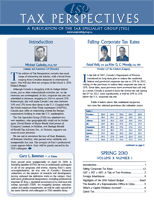
PDF Format
 Issue Contents Issue Contents
 All Issues All Issues
Spring 2010
Volume 10, Number 1
The information in Tax Perspectives is prepared for general interest only. Every effort has been made to ensure that the contents are accurate. However, professional advice should always be obtained before acting and TSG member firms cannot assume any liability for persons who act on the basis of information contained herein without professional advice.
Introduction
By Michael Cadesky, FCA, TEP
Cadesky and Associates LLP (Toronto)
The budget made a number of changes to the tax treatment of employee stock options.
From 2011 onwards, payroll withholding will be required on stock option benefits. Where certain conditions are met, an employee may claim a 50% deduction from the amount of the stock option benefit. In this case, withholding will be required only on the net taxable amount.
In 2000, a special deferral system was introduced to allow employees to exercise stock options and obtain stock, but not pay tax on the stock option benefit until the shares were sold. Although well intended, this legislation has been catastrophic for some. It allowed — and perhaps encouraged — people to exercise their stock options and then to hold on to the shares. But the dramatic decline in stock prices left many people holding stock worth far less than when the stock option was exercised. As a result, the employee has an economic loss but, from a tax perspective, the employee has income: there's an employment benefit (fully or perhaps 50% taxable) and a capital loss (which can only be deducted against capital gains). In many cases, the tax that would be triggered on selling the shares would exceed the proceeds received.
The budget now allows employees to "unwind" the tax treatment of stock options, as described above. When they sell their stock, there are no tax implications except for one: a special tax equal to 100% of the proceeds received.
The deferral system is to be eliminated, and persons wishing to take advantage of the rules to unwind stock option benefits have until the end of 2014 to do so. Moreover, this rule is retroactive to 2001, allowing people to restate their tax positions for prior years if they make the election to do so by April 30, 2011.
Lastly, where employees surrendered an unexercised stock option to the corporation, the payments were treated as if they were salary. The corporation would get a deduction in the normal way, and the employees could, if conditions were met, obtain a 50% deduction from the amount of their employment benefit. From budget date onwards, however, employees will not be able to get the 50% deduction unless the employer elects to forgo taking the tax deduction for the payment. This makes the rules symmetric: special reduced taxation is granted to the employees provided the employer does not, at the same time, obtain a tax deduction as well.
| 






